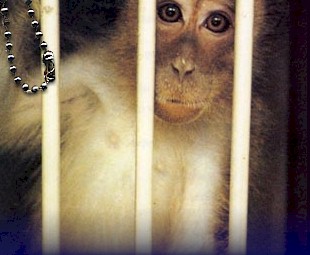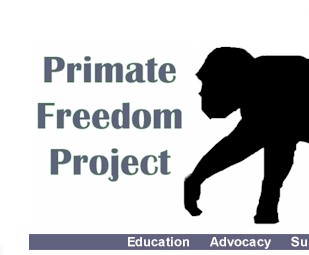






|
||||||||||||||||||||||||||||||||||||||||||||||||||||||||||||||||||||||||||||||||||||||||||||||||||||||||||||||||||||||||||||||||||||||||||||||||||||||||||||||||||||||||||||||||||||||||||||||||||||||||||||||||||||||||||||||||||||||||||||||||||||||||||||||||||||||||||||||||||||||||||||||||||||||||||||||||||||||||||||||||||||||||||||||||||||||||||||||||||||||||||
Understanding Primates Peacemaking Among Primates, by Frans DeWaal. DeWaal works at Yerkes. All of his books are interesting and worth
reading; this one especially. Be warned, though, DeWaal either blindly
supports the vivisection industry or is a coward. The rhesus macaques
he wrote about in this work were all sent to Louisiana for use in
infectious disease research even though the institution that owned
the monkeys, and for whom DeWaal had worked, had promised in writing
not to harm the monkeys. DeWaal was deafeningly silent. Through a Window, by Jane Goodall. In the Shadow of Man, by Jane Goodall. The Chimpanzees of Gombe: Patterns of Behavior, by Jane Goodall. Goodall's life's work has has arguably been the largest single factor in the public's recognition that chimpanzees are so like humans.
Gorillas in the Mist, by Diane Fossey
The Pictorial Guide to the Living Primates, by Noel
Rowe. This is the best general guide to all the living primate species
currently available. Almost Human: A Journey into the World of Baboons, by Shirley C. Strum. Chimpanzee Cultures, Richard W. Wrangham (Editor), et al. Great Ape Societies, McGrew. W. C. (Editor), et al.
How Monkeys See the World: Inside the Mind of Another Species, by Dorothy L. Cheney and Robert M. Seyfarth. Written by primate lab insiders, this landmark book points out that the vocalizations of monkeys are specific in their meaning. The Mentality of Apes, by Wolfgang Kohler. This is
an important classic. Secondarily, it shows how long science has
been aware that the minds of other primates are very similar to
ours. Look for a used copy; the current reprints are too expensive.
Chimpanzee Cross-Fostering and Human Language
Acquisition Kanzi : The Ape at the Brink of the Human Mind, by
Sue Savage-Rumbaugh and Roger Lewin. Savage-Rumbaugh and her husband
Duane Rumbaugh, have been associated with the Yerkes Primate Center
for some time. Neither have had the courage to really consider and
speak publicly about the implications of what they have learned
about the minds of apes and monkeys. Nevertheless, Kanzi is an important
book and underscores the sensitivity of the minds of those who are
experimented on in the primate labs. Next of Kin: My Conversations With Chimpanzees, by Roger Fouts and Stephen Tukel Mills. Lucy: Growing Up Human: A Chimpanzee Daughter in a Psychotherapist's
Family, by Maurice K. Temerlin. A sad book about the inevitable
results of raising a chimpanzee to believe she is human. Nim: A Chimpanzee Who learned Sign Language, by Herbert
S. Terrace. A classic in the literature of chimpanzee abuse. Terrace
first claimed that Nim learned sign language and then, sometime
after the book was published, he withdrew the claim and declared
that Nim had just been imitating his trainers. The story almost
deflected all serious consideration of the fact that animals can
learn to converse with humans in human language. The final analysis
by many observers was that Terrace treated Nim very poorly and unfairly. The Case for Rights The Great Ape Project, Peter Singer and Paola Cavalieri
(Editors). After reading this book we sent copies to all the members
of the U.S. Senate. Simply, the essays in this book demolish any
claim that the other great apes: bonobos, orangutans, gorillas and
chimpanzees are not entitled to basic rights. Animal Liberation, by Peter Singer. This is the book that launched the modern animal rights movement
and includes a chapter dealing largely with primate experimentation.
Drawing the Line: Science and the Case for Animal Rights,
by Steven M. Wise. Primate Vivisection and Abuse The Monkey Wars, by Deborah Blum. Blum won a Pulitzer
for the series of articles that made up this book. While she is
decidedly in support of experimenting on primates, she presents
an outstanding overview of the conflict. Though now a bit dated,
it is a must read for those trying to understand the history of
the modern debate regarding primate experimentation. Visions of Caliban: On Chimpanzees and People, by
Dale Peterson. This is a valuable book, but its worth is limited
by the lack of an index. Important historical events are recounted
and documented. Keep a notebook handy as you read. Brutal Kinship, by Michael Nichols and Jane Goodall.
This would be a coffee table book due to its large size and high
quality images. But it might give you nightmares. Human cruelty
to chimpanzees is presented in stark reality. Maternal Deprivation Experiments in Psychology: A Critique
of Animal Models, by Martin L. Stevens. (Out of print) An
exhaustive and impressive accounting of all the Harlowesque experiments
up until about 1985. In Defense of Animals has a few hundred copies
in their back room. What the Vivisectors Have to Say Why Animal Experimentation Matters: The Use of Animals
in Medical Research, Ellen Frankel Paul and Jeffrey Paul,
editors; published by the Social Philosophy and Policy Foundation
and by Transaction Publishers. Paperback edition. Through the Looking Glass : Issues of Psychological Well-Being
in Captive Nonhuman Primates, Melinda A. Novak and Andrew
J. Petto (Editors). Handbook of Squirrel Monkey Research, by Leonard
A. Rosenblum and Christopher L. Coe. Chris Coe is the director of
the University of Wisconsin’s Harlow Primate Psychology Lab,
a facility only a few feet away from the Wisconsin Regional Primate
Research Center, but indistinguishable otherwise. The text provides
much data about the history of hurting these small animals. The Primates (Out of print.)This is one of the old
Life Nature Series published by Time/Life Books. It is still pretty
easy to find in used bookstores and thrift shops; the series was
sold through the mail. Of especial interest is the chapter on primate
experimentation. The photographs of the experiments are startling.
We are told that the reason for the then band new NIH primate centers
was to develop a supply of monkeys for organ transplants. Debunking the Pseudoscience of Vivisection Sacred Cows and Golden Geese: The Human Cost of Experiments
on Animals, by C. Ray Greek and Jean Swingle-Greek. Specious Science: How Genetics and Evolution Reveal Why Medical Research on Animals Harms Humans, by C. Ray Greek and Jean Swingle-Greek. Together, the Greeks' books are essentially volume one and two of an extensive survey of medical progress and the historical role of animal experimentation. Extensively documented and supportive of science, these texts expose the facts behind the myths created by the spin doctors of the vivisection industry.
Aping Science: A Critical Analysis of Research at the Yerkes
Regional Primate Research Center, by the Committee on Animal
Models in Biomedical Research. (Out of print.) An amazing refutation
of the entire Yerkes program. Contact the Medical Research Modernization
Society (MRMC) for a lead on old copies. Past Claims of Science and Society Ape, Man, Apeman: Changing Views Since 1600, Raymond
Corby and Bert Theunissen (Editors). (Out of print.) Hard to find,
but well worth the search. Slavery Defended: The Views of the Old South, Eric
L. McKitrick (Editor). This is an important work. Prior to the Civil
War many intellectuals argued that there were compelling reasons
to keep Africans enslaved. Africans on Stage: Studies in Ethnological Show Business,
Bernth Lindfors (Editor). White men have a history of exhibiting
other primates whether human, other ape, or monkey. We’re
still at it. The Nazi Doctors: Medical Killing and the Psychology of Genocide,
by Robert Jay Lifton. This may be one of the most important books
on this list. It is impossible not to wonder just how we can be
so very cruel to each other. Lifton’s work suggests that
we are all capable of the most horrendous behavior if we allow ourselves
to let others think for us. Today, the vivisectors have allowed
federal regulations to define their morality. Death of Medicine in Nazi Germany : Dermatology and Dermatopathology
Under the Swastika, by Wolfgang Weyers, A. Bernard Ackerman.
Home Page | Our Mission | News |